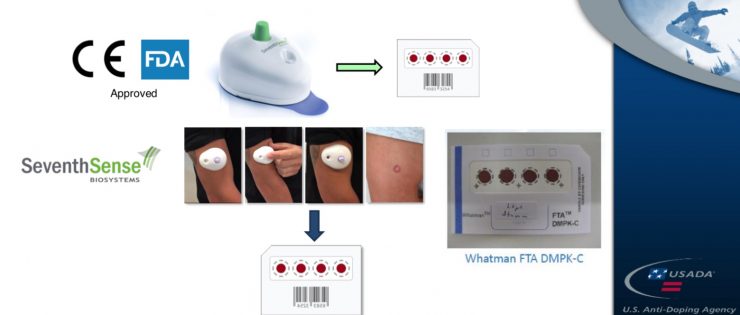
Last week WADA sent out a press release with this catchy title: WADA leads exciting collaboration on dried-blood-spot testing.
Here’s what this means: WADA signed a memorandum of understanding with seven anti-doping agencies, including the U.S. Anti-Doping Agency (USADA) to further explore the viability of DBS (dried-blood-spot) testing as part of its global anti-doping tool kit. WADA claimed, “A further objective of the project is to develop guidelines for the collection, transport, analysis and storage of DBS as well as to carry out research that may be required to achieve harmonization of practice in the anti-doping context.”
Harmonization may be a tall order. But it’s worth getting a better understanding of DBS. According to a 2018 USADA publication, the agency said DBS would not replace intravenous (venipuncture) collection methods. And stated in a 2018 slide presentation posted online titled Dried Blood Spot (DBS) Testing & the Potential for the ABP, (ABP= Athlete Blood Passport), by Dr. Matt Fedoruk, the Chief Science Officer at USADA, “DBS is a promising complementary method to increase detection and deterrence; however urine and venous blood remain the gold standard.”
DBS has some major upsides. It requires approximately five drops of blood. DBS does not require a phlebotomist to administer and test samples do not require a rigid temperature controlled environment. What DBS promises is a simpler, less invasive, and cheaper alternative to intravenous blood testing. It remains to be seen if DBS will over promise and under deliver – but it does appear to be in part fast tracked for implementation at the 2020 Tokyo Summer Olympics.
WADA cites these “potential” advantages in the October 3, press release:
- Simplification of sample collection (e.g. a finger prick)
- Less invasive than current methods of taking urine or blood samples so better for the athlete experience
- The need for only a very small volume of blood for the test (depending on the type of analysis)
- Less expensive to collect and transport DBS samples compared with current methods
- Less space needed to store the samples
- Potential benefits with regards to sample stability (less degradation)
Currently, DBS is not used as an official testing method for banned substances. In 2017, according to WADA’s Anti-Doping Testing Figures [for] Samples Analyzed and Reported by Accredited Laboratories in ADAMS, 2971 samples total were tested in cross-country skiing. That includes urine and blood samples, and both in and out of competition testing. Blood samples constitute the overwhelming minority of tests with 42 in competition and 392 out of competition blood test administered. In 2017, not a single cross-country athlete was flagged for a positive test using a blood sample. This was for the testing year prior to the 2018 Nordic Ski World Championships where Austrian authorities arrested several athletes for blood doping.
Although we are committed to skiing, here goes a leap into the realm of mixed martial arts. Back in 2018, USADA asked the UFC to pilot a DBS testing program.
Jeff Novitzky, a former DEA agent better known for his role in investigating BALCO and US Postal for doping violations, now the Ultimate Fighting Championships (UFC) VP of Athlete Health and Performance, provides a useful primer on dried-blood-spot testing in this clip filmed during a podcast interview with Joe Rogan. The relevant information begins at 2:11:00. (UFC and mixed martial arts, in general, have had their share of systemic doping problems.)
Jason Albert
Jason lives in Bend, Ore., and can often be seen chasing his two boys around town. He’s a self-proclaimed audio geek. That all started back in the early 1990s when he convinced a naive public radio editor he should report a story from Alaska’s, Ruth Gorge. Now, Jason’s common companion is his field-recording gear.



